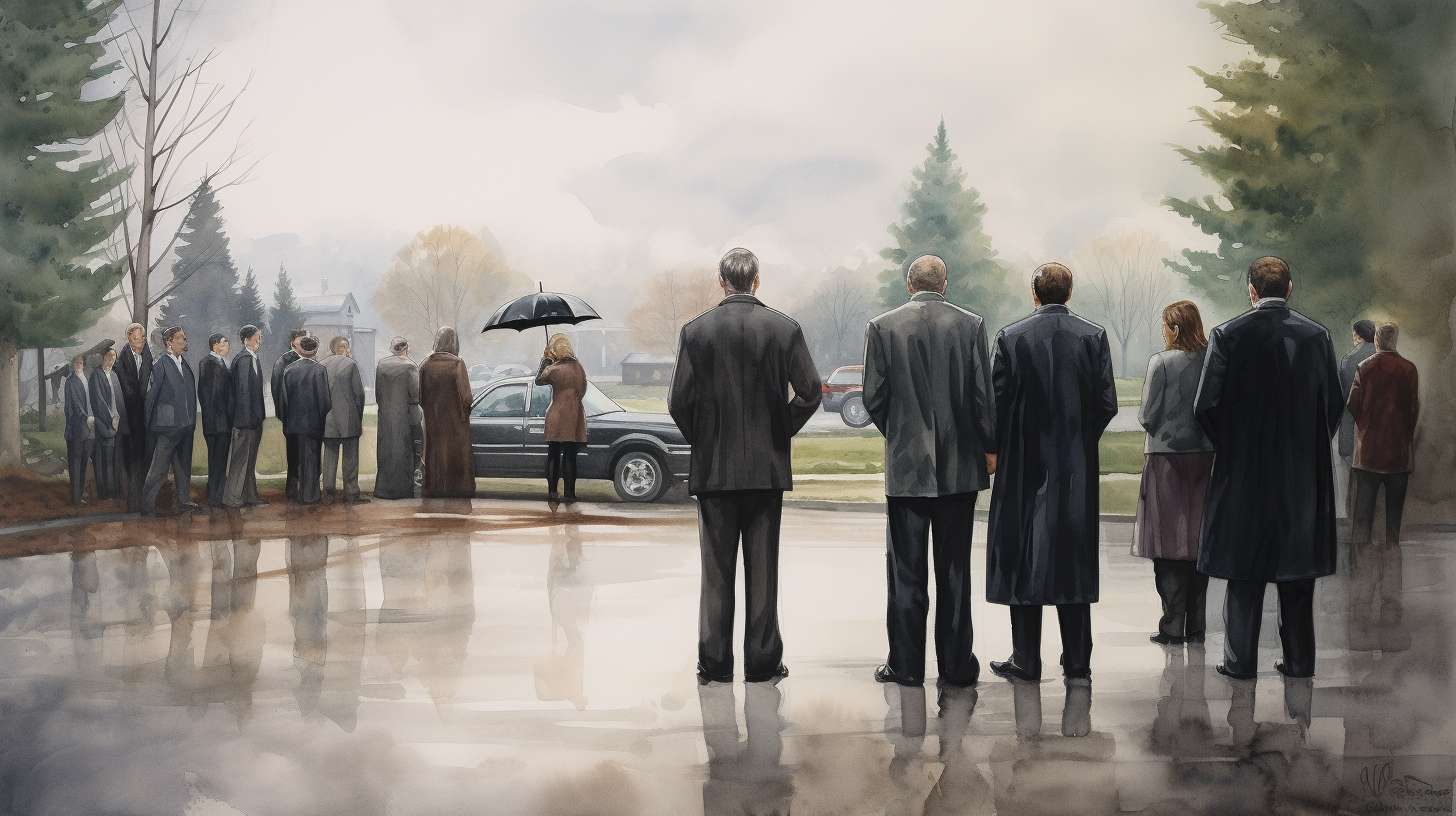- by Tim Thompson
Coping with grief after a sudden death

Understanding Sudden Death and Grief
Definition of Sudden Death
Sudden death refers to a sudden, unexpected death that occurs within a short period and can be one of the most painful experiences to grapple with, often caused by unforeseen circumstances such as accidents, heart attacks, or other medical emergencies. It can leave bereaved people struggling to comprehend the abrupt and unexpected nature of the loss of their loved one’s life.
Coping with the Shock of Unexpected Loss
Dealing with the shock of a sudden death can be incredibly challenging, leaving bereaved individuals struggling to come to terms with the abrupt separation from the person who’s died. The sudden absence of someone close can have a profound impact, disrupting one’s ability to cope and navigate through the intense emotions of grief.
Navigating the Intense Grief After a Sudden Death
The intense grief that follows a sudden death can be both emotionally and physically draining. It’s crucial for bereaved individuals to find ways to cope with the overwhelming emotions and seek support from family, friends, or professional organizations to help navigate the difficult journey of grief after a sudden death.
Legal and Practical Matters
Registering the Death and Dealing with the Estate
Registering the death of a loved one is a crucial step in the bereavement process, marking the official legal acknowledgement of the death. This process typically involves providing the deceased’s details to a local registry office, alongside a medical certificate of death. Once registered, the next of kin receives a death certificate, an essential document for closing accounts, claiming life insurance, and beginning estate administration. Dealing with the estate encompasses gathering all assets, paying off any debts, and distributing what remains according to the will or, in its absence, the laws of intestacy. This task can be emotionally taxing and complex, often requiring the navigation of financial accounts, property, and personal belongings, making professional legal advice a valuable asset during this time.
Applying for Probate and Handling Legal Processes
Applying for probate is a necessary step when managing the deceased’s estate, especially if they owned significant assets or property that needs to be transferred or sold. Probate grants legal authority to executors or nearest relatives to handle the deceased’s assets as per their will or the law. This process involves submitting an application to the probate registry, including the original will (if one exists), the death certificate, and an estimate of the estate’s value. Handling the legal processes of probate requires meticulous attention to detail, from accurately valuing the estate and paying any owed taxes, to distributing assets among beneficiaries. Given its complexity and the emotional context, many opt for legal assistance to navigate probate and ensure compliance with all legal and financial obligations.
Arranging the Funeral and Honoring the Person Who Died
After the sudden death of someone close, it’s essential to address the legal and practical matters, such as registering the death, dealing with the estate, applying for probate, and handling legal processes. Additionally, arranging the funeral and honouring the person who died plays a significant role in providing closure, paying tribute to their life and managing the funeral costs.
Seeking Support and Healing
After the sudden loss of a loved one, it’s crucial to understand the bereavement process and seek bereavement support to navigate the overwhelming emotions and intense grief. Bereavement support provides a safe space for individuals to express their feelings, process their emotions, and find comfort in knowing that they are not alone in their journey of healing.
The Bereavement Process and Finding Bereavement Support
The bereavement process encompasses the emotional, psychological, and physical responses to the loss of a loved one. Finding bereavement support from organisations, support groups, or mental health professionals can provide valuable guidance and resources to help individuals cope with the challenges of grief after a sudden death. Seeking support is a crucial step in rebuilding a sense of normalcy and finding healing amid the pain of loss.
The Grieving Process and Coping with Loss
Grieving after a sudden death is a complex and individual experience. Coping with the shock of a sudden death, and navigating the rollercoaster of emotions requires patience and self-compassion. This is felt profoundly by those closely linked in relationship with the person who passed away. Bereaved individuals need to find healthy coping mechanisms, such as talking to a trusted friend, participating in grief counselling, or engaging in activities that bring solace and comfort during the grieving process.
Organising and Utilising Resources for Bereavement Support
Organising resources for bereavement support involves reaching out to local support groups, mental health professionals, and organisations specialising in grief counselling. Utilising these resources can provide valuable tools and techniques to manage emotional upheaval and find comfort in knowing that support is readily available during the difficult journey of grief.
Find bereavement support and services
Finding bereavement support and services can significantly aid in coping with the aftermath of a sudden loss. Whether it’s through online resources, community support groups, or professional counselling services, seeking bereavement support is a proactive step towards healing and finding solace after experiencing the sudden death of a loved one.
| Organization | Description | Website | Contact |
|---|---|---|---|
| Cruse Bereavement Care | Free, confidential support for adults, children, young people, and families facing grief. | https://www.cruse.org.uk/ | 0808 808 1677 (Helpline) |
| The National Bereavement Service | Information and resources for managing grief, including local support groups and helplines. | https://thenbs.org/ | 0800 444 2121 (Helpline) |
| The Good Grief Trust | Support for adults, children, and young people newly bereaved. | https://www.thegoodgrieftrust.org/ | 0800 00 11 11 (Helpline) |
| Mind | Information and resources about bereavement, including self-care tips and finding support groups. | https://www.mind.org.uk/information-support/guides-to-support-and-services/bereavement/about-bereavement/ | 0300 123 3393 (Info line) |
| Marie Curie | Bereavement support for adults who have lost someone to any illness. | https://www.mariecurie.org.uk/help/support/bereavement | 0800 090 2309 (Support Line) |
| Sue Ryder | Online community, video chat counselling, and personalized text message support for bereavement. | https://www.sueryder.org/ | 0800 169 0933 (Helpline) |
| The Compassionate Friends | Support for anyone grieving the loss of a child, at any age or from any cause. | https://www.tcf.org.uk/ | 0845 123 2340 (Helpline) |
| Winston’s Wish | Support for children and young people facing bereavement. | https://www.winstonswish.org/about-us/contact-page/ | 0808 802 0045 (Helpline) |
| Child Bereavement UK | Support for families and individuals affected by the death of a child. | https://www.childbereavementuk.org/ | 0800 028 8848 (Helpline) |
| The Ruddy Grief Project | Online resources and support groups for young adults (18-30) coping with grief. | https://www.thewildproject.org/ | Online community and info |
The first step when someone dies unexpectedly
After the unexpected death of a loved one, the first steps involve addressing the immediate practical and legal matters, among other things, dialling 999 for immediate help as required. This includes registering the death, notifying the coroner, and obtaining a medical certificate. Additionally, informing the tell-us-once service and arranging the funeral with the assistance of a funeral director are essential steps in managing the circumstances of the death and honouring the person who has passed away.
Coping with the Shock of an Unexpected Death
When coping with the sudden loss of a loved one, the shock and disbelief Bereaved individuals may find it challenging to come to terms with the abrupt separation. The sudden absence of someone close has a profound impact, disrupting one’s ability to cope and navigate through the intense emotions of grief. Seeking support from others who may understand, like family, friends, or professional organizations like the national suicide prevention lifeline, is crucial in coping with grief after a sudden death.
Apply for Probate
Applying for probate is a vital legal step after the sudden death of a loved one, one of the most painful situations anyone can experience. This process involves obtaining the legal right to deal with the deceased person’s estate. Identifying, gathering, and valuing the assets of the individual who has passed away includes personal or financial information. The probate process provides the necessary legal authority to administer the estate as per the deceased’s wishes or in line with the law.
Deal with the Estate
Dealing with the estate involves the legal and practical responsibilities surrounding the deceased person’s assets, liabilities, and property. This process encompasses administering the estate by the law and the wishes of the deceased. It includes tasks such as handling financial matters, distributing assets to beneficiaries, settling any outstanding debts or taxes, and tackling your loved one’s funeral costs.
Register the Death
Registering the death is a crucial step that needs to be carried out promptly after the unexpected passing of a loved one. This process involves formally recording the death with the relevant authorities. It typically entails obtaining the death certificate, which provides essential information about the deceased, including their cause of death. Registering the one death is an essential step in managing the legal and administrative aspects following the loss of a loved one. It’s best done at a local registrar.
If the person who died had a lasting or enduring power of attorney
When coping with the aftermath of a sudden loss, it’s essential to address legal and practical matters, especially if the deceased had a lasting or enduring power of attorney. This legal provision grants authority to an appointed individual to handle the affairs of the person who has lost mental capacity. Navigating the legal implications and responsibilities associated with the power of attorney amid the grieving process can be intricate. Seeking guidance from legal professionals or relevant authorities can help in understanding and fulfilling these legal obligations effectively.
What Factors Impact the Grieving Process
The grieving process after a sudden death is influenced by various factors, including the circumstances of the loss, the individual’s support system, and their coping mechanisms. The sudden and unexpected nature of the death can intensify the emotional impact, making it challenging to navigate through the initial shock and disbelief if no resuscitation is successful. Additionally, the availability of community support and the ability to access bereavement services can significantly impact the grieving process, providing valuable resources and assistance during this difficult time. Understanding these factors enables individuals to address their unique needs and seek appropriate support to cope with their grief effectively. The relationship with the person who has passed can significantly influence these needs.
What is the grief process?
The grief process encompasses the emotional, cognitive, and behavioural responses to the loss of a loved one. It involves navigating through stages of shock, denial, anger, bargaining, depression, and ultimately, acceptance. The sudden and unexpected death of someone close can disrupt the natural progression of the grief process, intensifying emotional turmoil and challenging the individual’s ability to cope effectively. By understanding the complexities of the grief process, bereaved individuals can acknowledge and validate their emotions, seek support, and gradually work towards finding a sense of healing and acceptance amid their profound loss.
Check if you need to apply to stay in the UK
After experiencing the unexpected death of a loved one, if you are a non-UK resident, it’s important to check if you need to apply to stay in the UK. The sudden loss may require individuals to make necessary legal and immigration arrangements to ensure their continued stay in the country. Seeking guidance from immigration authorities and legal professionals can provide clarity on the steps to be taken and the requirements for extending or regularising one’s stay in the UK following a sudden and unexpected bereavement.
Connect the bereaved with community support.
Connecting the grievers with community support is a vital step in the aftermath of the loss of a loved one. Community support groups, bereavement organisations, and mental health professionals can offer invaluable assistance and resources to individuals navigating grief after the unexpected death of a loved one. Facilitating connections with these support networks enables bereaved individuals to access guidance, emotional support, and practical assistance, fostering a sense of community and understanding as they navigate through their unique grieving journeys.
Frequently asked questions about coping with grief.
How does an organisation assist when coping with the sudden death of a loved one?
Many organisations provide valuable support and guidance through such difficult times. They can advise on important issues like how to register a death, arrange a funeral, and even provide emotional support for those struggling to cope. The government’s gov.uk website is a comprehensive resource with information about what to do when someone dies.
How do I register a death and which organisation should I contact?
You can register a death and may seek professional guidance from your local registrar. You will usually need to do this within 5 days in the UK, or 8 if the death has been registered with the coroner. This process may take some time and it’s essential to have assistance from
What happens if the person dies suddenly from COVID-19 and I am unable to register the death?
If the death is sudden or the result of COVID-19, the process may be slightly different as a post-mortem might be required. The person who died may be kept in the hospital mortuary until the post-mortem can be carried out. You should contact 0800 for any queries regarding this matter.
How long after death does the registration process begin?
The process of registering a death may begin as soon as one day after the person’s death and must be completed within 5 days, provided no post-mortem examination is required. If death is sudden or from unexpected causes, it may need to be reported to the coroner who may delay the registration process and the police will also be involved.
Who do I need to contact for a GP or hospital death?
You need to contact the GP if the person died at home, or the hospital if the person died there, to get the medical certificate of the cause of death. Post this, you can contact the local register office to register the death.
What are the next steps post-death registration from an organisation standpoint?
Certain government departments and services need to be informed about the death. You can use the Tell Us Once service on the gov.uk website to help streamline this process of communicating loss and handling personal or financial information. Subsequently, you would need to arrange for burial or cremation based on the deceased person’s wishes or religious beliefs.
What help and support can organisations offer for people struggling to cope with a sudden death?
Different organisations can offer support through grief counselling, group therapy, and other forms of assistance. It can be incredibly difficult to handle the pain of grief, especially if the death is sudden, hence reaching out to professionals and support networks can be very beneficial.
How to manage the pain of grief after a loved one passes away?
Dealing with the death of a loved one can be incredibly difficult and make one feel particularly vulnerable, To manage the pain of grief, consider reaching out to a mental health professional or a support group.
Can an organisation help me understand the steps I need to take after the sudden death of a loved one?
Yes, many organisations can provide insight into the steps you need to take after someone dies. You can contact your local register office or call the government’s official helpline to get started with the process or find information on the gov.uk website.
How can I inform friends, family, and other organisations about the death?
Organising contact lists and informing every organisation or family member and friend about the death can be overwhelming. An organisation can help facilitate the process by offering guidance or simple steps to make it easier to handle situations when someone has passed away unexpectedly.







